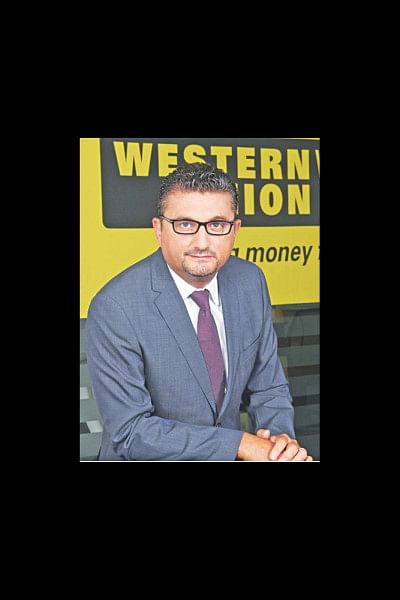Western Union optimistic about Bangladesh’s digital future

Western Union, the leader in global payment services, is optimistic about Bangladesh’s digital future as many sectors of its economy are embracing modern technologies, said a top official of the company.
“We would not have launched the international remittance services in Bangladesh had we not believed in the ongoing digitisation process in the country,” said Jean Claude Farah, president for Middle East, Africa and Asia Pacific at Western Union.
Farah was recently in Dhaka to roll out an international remittance transfer service in association with bKash and MasterCard.
With the tie-up, migrant workers will now be able to directly send remittances to the 22 million bKash users.
“We can only be optimistic about its future as the country has eight million migrants abroad, and earns $15 billion in remittances with its GDP growing by more than 6 percent a year,” he told The Daily Star in an interview.
“I think it’s a revolution in the money transfer industry.”
Previously, people from around the world could send money to Bangladesh either in cash or someone’s bank account through Western Union.
The new move will make life easier for about eight million Bangladeshis living abroad by helping them send money to their beneficiaries in Bangladesh with ease, said Farah.
He said Western Union is, thus, a part of the government’s vision for a Digital Bangladesh. The company started its operations in Bangladesh in 1994.
Although it has presence in 13,000 locations in Bangladesh, it does not have a huge coverage in the rural areas, because the institutions and banks it works with do not have a strong footprint in those far-flung areas.
Thanks to the remittance service, customers can now either cash out the money via 120,000 bKash agent locations across the country, or utilise the account balance to make person-to-person fund transfers, top up mobile airtime, pay bills and buy goods in shops.
Farah did not give a figure on the amount of remittance that enters Bangladesh through Western Union, but said, with the new tie-up, the market share will increase drastically.
Bangladesh is the eighth largest recipient of international remittance in the world, and received $15.31 billion last fiscal year.
Rural areas receive 40 percent of the remittance flowing into Bangladesh, and it is mainly used for healthcare, education, food and housing.
“Remittance entering Bangladesh is well-poised to grow. The more you provide solutions and choices to customers, the more chances you will have to grow faster.”
The service will particularly benefit the people who live in rural areas, who have limited access to formal banking channels. The bank account penetration rate in Bangladesh is about 18 percent.
“Being able to offer international money transfers into mobile phones in a nation that has a greater penetration of mobile phones than bank accounts is central to facilitating financial inclusion.”
Globally, Western Union has more than 500,000 agent locations, and 100,000 ATMs and kiosks in over 200 countries and territories. It moved more than $150 billion in 2015 for consumers and business clients.
Its revenue grew 3 percent year-on-year in 2015. The company’s margin is about 20 percent. “This is unheard of in the industry.”
Farah, who joined Western Union in 1999, said they are providing what the customers have been asking for, and those are mobile wallet and digitisation.
Bangladesh is one of the first markets where mobile wallet was launched.
Farah, a migrant himself, said Western Union works and operates where migrant workers live.
He said the company provides its customers with competitive exchange rates. In case of cross-border remittance service, senders will have to pay the fees.
He also talked about the recent cyber heist of Bangladesh Bank funds.
“What happened to Bangladesh Bank is not an isolated case. This has happened before in the world. I don’t know why people are blowing it out of proportion. You just have to pick yourself up and make sure that you look at the incident as a lesson, and strengthen your operating procedures to avoid such a situation in the future.”
“Fraud does happen. The most important thing is how quickly you can react to it and how quickly you can prevent it from happening again.”
Farah said there are 10,000 employees at Western Union. Of them, 2,500 are in the compliance department. It invests $200 million every year in compliance.

 For all latest news, follow The Daily Star's Google News channel.
For all latest news, follow The Daily Star's Google News channel. 



Comments